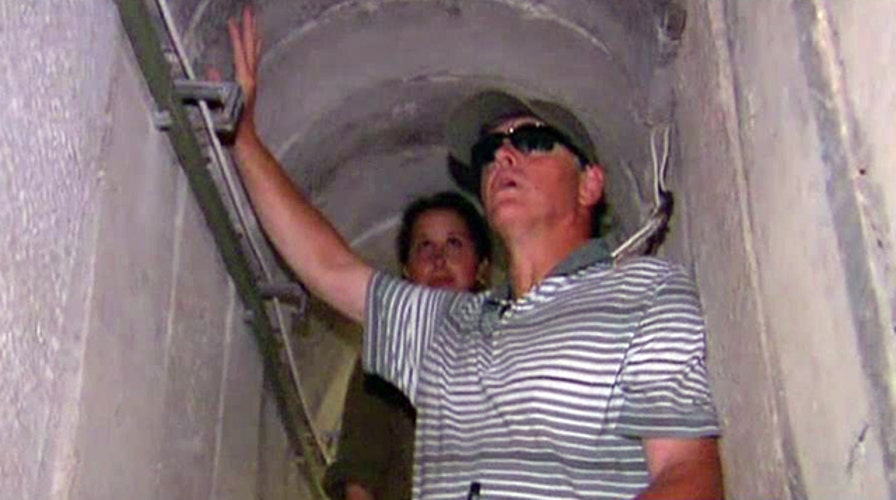Exclusive: Sean Hannity tours the Hamas tunnels
IDF spokesperson Libby Weiss provides insight into the threat
The Israeli military has said that all of its ground forces have been removed from Gaza as a 72-hour cease-fire went into effect Tuesday.
The truce, agreed upon Monday by Israel and Hamas, took effect at 8 a.m. local time Tuesday (1 a.m. ET). The Times of Israel reported that a barrage of rockets were fired from Gaza minutes before the cease-fire was due to take effect. The paper also reported that Israeli's Iron Dome missile defense system intercepted two rockets over central Israel, while two other rockets fell into open areas in southern Israel near the Gaza border, causing no damage or injuries.
In Gaza City, where streets had been deserted during the war, traffic picked up and shops started opening doors.
Israeli military spokesman Lt. Col. Peter said Israel withdrew all its remaining forces from Gaza on Tuesday after troops neutralized cross-border tunnels that were built for Islamic militant attacks inside Israel.
"Overnight, we completed the destruction of 32 tunnels in the Gaza Strip," Lerner said. "They were part of a strategic Hamas plan to carry out attacks against southern Israel.
Israel launched its ground offensive in Gaza on July 17, nine days after launching airstrikes on Hamas militants and weapons caches.
The Times of Israel, citing an Israel Defense Forces source, reported that approximately 900 Hamas operatives have been killed during the fighting. By contrast, the Hamas-run Gaza Health Ministry has repeatedly claimed that 1,900 Palestinians have been killed, mostly civilians. The war has also claimed the lives of 67 Israelis, all but three of whom were soldiers.
Lerner said that some some 3,500 rockets had been fired at Israel by the time the cease-fire came into effect. He estimated that Israeli forces destroyed another 3,000 rockets on the ground -- but that Hamas has an equal number for future use. Lerner also declined to say how many ground forces had been involved in the Israeli operation, though the military acknowledged calling up 86,000 reservists, including rotations, during the course of its Gaza operation.
One of the hardest-hit areas of recent days was the southern Gaza town of Rafah, which had experienced several days of heavy Israeli shelling and airstrikes, starting Friday, after Israel suspected an Israeli soldier had been captured by Hamas. Israel later said the soldier was killed in battle that day.
"I never saw anything like this in my life," Tawfiq Barbakh, a 67-year-old father of 12, said of the Israeli shelling as he surveyed his badly damaged home. "I don't know how many shells landed every minute but it felt like 20 or 30."
Israel and Hamas are scheduled to hold indirect talks in Cairo during the cease-fire period in an attempt to broker a more durable settlement. However, the gaps between the sides are vast.
Hamas wants Israel and Egypt to lift their seven-year-old Gaza border blockade, which Israel says would lead the militant group to import more weapons with which to attack Israeli soldiers and civilians. For its part, Israel has insisted that Hamas be disarmed.
The Palestinian delegation in Cairo is led by one of Palestinian President Mahmoud Abbas’' confidants, but also includes members of Hamas and other factions.
On Monday, the delegation presented a joint list of demands to Egypt, said Hana Amireh, a West Bank-based PLO official who is in touch with the delegation.
The demands include a call for internationally funded reconstruction that would be overseen by an Abbas-led government that was formed in a unity deal with Hamas before the war.
Mohammed Mustafa, the West Bank-based deputy prime minister of the technocrat government, told The Associated Press that efforts are under way to arrange a pledging conference of donor countries in Norway at the beginning of September.
International Mideast envoy Tony Blair is part of efforts to arrange that gathering in Norway, Blair's office said.
Israeli government officials were not available for comment. Israel TV's Channel 10 said the Israeli delegation had not yet left for Cairo. The report said Israel wanted to make sure the cease-fire held before sending negotiators to Egypt.
Over the years, Hamas has smuggled rockets and other weapons into Gaza through smuggling tunnels under the Gaza-Egypt border. The flow only halted after a new government in Egypt took over a year ago and destroyed the tunnels.
Previous attempts by diplomats to broker an end to the fighting have failed, and ending the conflict without a sustainable truce a sustainable truce raises the probability of more cross-border fighting in the future.
The Associated Press contributed to this report.

